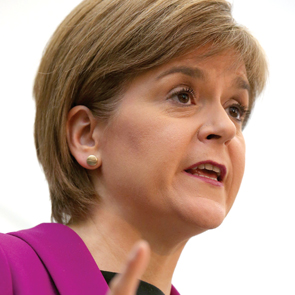The Bishops in Scotland on Friday sent out the text of a pastoral letter ahead of the General Election on 7 May that will be read out in parishes this weekend.
The letter sets out principles of Catholic social teaching that will cover the major issues before voters including the question of nuclear weapons.
In the text, the bishops say that nuclear weapons represent a "grave threat to the human family" and they question extra spending on arms.
The bishops write: "Successive UK Governments have made plans to replace and upgrade our nuclear weapons capacity. This is despite the considerable costs involved and in the face of persistent moral objections, to say nothing of international agreements we have entered into which commit us to work against the proliferation of such weapons. While recognising each country’s right to defend itself, the existence of nuclear weapons, and their possible proliferation, continue to represent a grave threat to the human family."
The issue of Britain's Trident nuclear defence has become politically charged as the Scottish National Party (SNP), led by Nicola Sturgeon, is committed to the removal of strategic nuclear weapons from Scotland currently located at the Faslane base.
But on Wednesday, during a debate between party leaders in Scotland, Jim Murphy, Labour leader and a Catholic, mounted a passionate defence of nuclear weapons saying he did not want a disarmament that would leave Iran and North Korea with a nuclear bomb.
Other issues covered by the letter include the economy, concerns about intolerant secularism and life issues.
Speaking ahead of the letter’s release, the Bishop of Paisley, John Keenan, spoke out last week strongly in favour of the Church’s involvement in the public sphere saying: “We need to be involved in politics, but not in power.”
His diocese and a number of Catholic organisations have recently been accredited as Living Wage employers for their active support of a minimum £7.85 hourly rate.
In a talk to school pupils at St Mirin’s Cathedral Bishop John Keenan, the youngest bishop in Britain and a strong advocate of the Living Wage, described faith as something done with the hands and not just on one’s knees.
After explaining the historical background to the Church's withdrawal from politics following the Reformation and later re-engagement in line with the changing social circumstances brought about by the Industrial Revolution, the bishop told his audience that “there is certainly a consensus among the bishops of Scotland, taking their lead from Pope Francis' Evangelii Gaudium that theirs isn't a Gospel that is not social. You can't love God without loving your country and the interest of the country.”
He went on: “You can't be concerned about your faith without being concerned about the poor, and you can't be concerned about heaven without being concerned about the earth.”
Bishop Keenan said that since the economic crash of 2008 the effects of poverty had been felt more widely across society and that the Paisley diocese has been contacted by East Renfrewshire Council calling for a collaborative effort in dealing with poverty.
The 2010 bishops’ general election guidance said previous generations of Catholics would “never have voted for any candidates who “refused to protect unborn human life,” supported assisted suicide or “rejoiced in same-sex unions.”
Above: Nicola Sturgeon, leader of the Scottish National Party. Photo: AP




 Loading ...
Loading ...